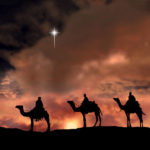Speculative Love, Part 6: Love Does Not Compute
 By way of closing this series on love in speculative fiction, I wanted to talk briefly about a quality of love that makes it problematical for science fiction in particular: love is not logical.
By way of closing this series on love in speculative fiction, I wanted to talk briefly about a quality of love that makes it problematical for science fiction in particular: love is not logical.In a genre enamored of artificial intelligence and all things computerized, robotic, and positronic, love poses a special difficulty because computers are based on logical operations: “If A and B, then C.” “If not A, then B.” “If A or B, then C and D.” Every input yields a predictable output.
From this point of view, the idea of a robot that can love is a contradiction in terms, not that it seems to bother science fiction writers very much. Such a robot would have to make sense of inputs that are ambiguous or inherently in conflict (A: She smiles. B: She calls me an idiot. C: She loves me. D: I love her.), and use its logic circuits to process them in an illogical manner (If A and B, then C or not C, and D or not D). Yes, there is such a thing as fuzzy logic, but it’s beyond the scope of this article and doesn’t reinforce my point here. Move right along, and pay no attention to the man behind the curtain.
If you’ve spent any time at all watching Star Trek, you probably know that the most effective way to defeat a malevolent robot is to present it with a logical paradox…
Kirk, whispering in malevolent robot Norman’s ear: “You can’t believe Harry. Everything Harry says is a lie.”
Harry Mudd, whispering in Norman’s other ear: “Now, listen very carefully, Norman my boy…I. Am. Lying.”
Norman has catastrophic processor failure and locks up, smoke spewing from his ears. The universe is saved. Huzzah!
The incompatibility of emotion and computation is illustrated in a Star Trek, The Next Generation episode, “The Offspring.” Android LtCmdr Data decides he needs to explore parenthood and constructs a daughter using his own design as a template. He names her Lal. He inadvertently surpasses his programming and makes her capable of experiencing emotions, including love. Unfortunately, this is a bug, not a feature, and Lal’s emotions generate a cascade failure in her positronic brain that ends her artificial life. As for Data himself, the closest he can get to love is a few extra nanoseconds of processing speed when he’s near people he’s “grown accustomed to.” His emotional shortcomings are solved later in the Trek saga with the deus ex machina of an “emotion chip,” confronting him with the new problem of how to interpret his new human emotions, which aren’t nearly so orderly as his other subroutines.
Okay, robots as we know them aren’t capable of love as we know it because love isn’t logical. So what?
Well, our very existence hinges on the fact that love isn’t logical. Think about it. God, the creator of the universe, watches the first man and woman rebel against him and violate His very clear and simple instructions, which include the information that the penalty for doing so is death. What does He do? The logical thing would be to destroy the offending creatures, as advertised, and start fresh. Straight line from problem to solution. Instead, because he loves us so much, he takes on humanity and offers Himself as the sacrifice for our sin, in our place.
It’s preposterous. Ridiculous. The Author of Creation becomes a miniscule dot on a tiny speck in a hazy cloud of dust in a nondescript corner of an inconceivably vast cosmos. To save a race of ungrateful, rebellious little dots. Because of love.
It just doesn’t compute, and I, for one, am glad it doesn’t.
P.S. – For more on love and logic, I highly recommend the classic non-spec-fic short story, “Love is a Fallacy,” by Max Shulman. Don’t forget your raccoon coat.











































I think that’s what made the Yargo such fun (by Jacqueline Susan). She meets this whole race of Vulcan-like people who have expunged emotion from their race, and she confronts them with the silliness of love. And she changes them all.
It reminds me of the song “love like crazy” because that’s what we need to do.
space-tacular article! (really though, your cleverness and meaningfulness are both there.)
signed,
a dot
Wow. You just made me feel smaller.
Bob: Wow. You just made me feel smaller.
And that’s the point. God doesn’t see us the way we see ourselves, or measure our value based on human measures of size, or weight, or longevity. From His perspective, every little “dot” has an importance as far beyond our comprehension as the vastness of the universe we live in.
When I consider your heavens,
the work of your fingers,
the moon and the stars,
which you have set in place,
what is man that you are mindful of him,
the son of man that you care for him?
You made him a little lower than the heavenly beings
and crowned him with glory and honor.
You made him ruler over the works of your hands;
you put everything under his feet
— Psalm 8: 3-6